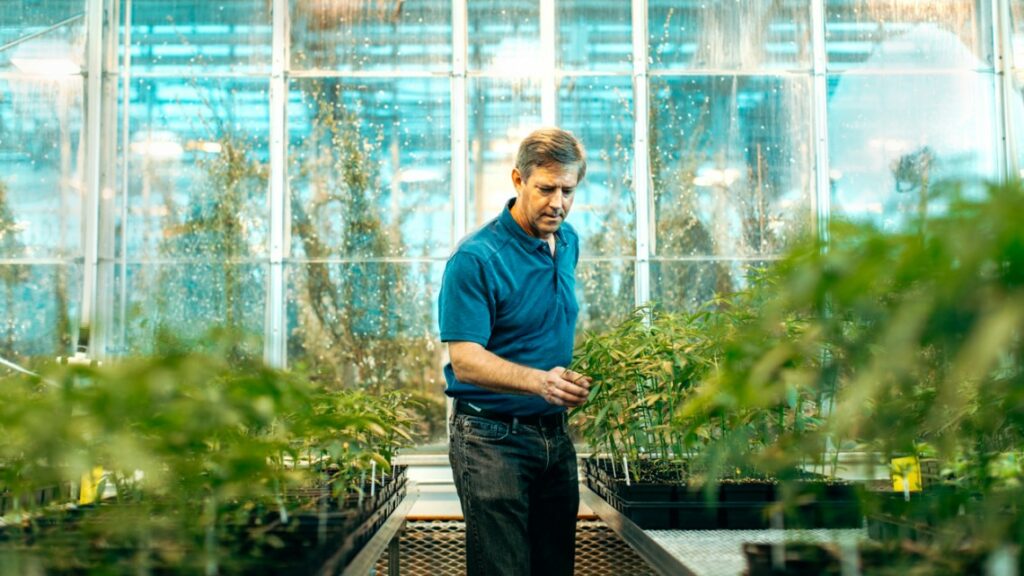Cornell University researchers say they’ll use $2 million in recently announced funding for long-term research into hemp genetics, hoping to deliver varieties that will improve yields at lower latitudes.
The research, led by Larry Smart, professor at Cornell’s School of Integrative Plant Science, aims to understand the genetic basis of photoperiod threshold – the amount of light a plant needs to reach various stages of development.
The research has a goal to develop hemp genetics for grain, fiber and cannabinoid production. It is supported by two grants totaling $1,170,000 from the Foundation for Food & Agriculture Research (FFAR), and matching funds from foundation partners, to total $2,340,000.
Photoperiod challenge
“Because Canada and Europe have longer days than the U.S. during the summer growing season, hemp varieties from these areas tend to result in smaller yields, and thus limited profit, when grown in the U.S.,” FFAR said in a press release. The photoperiod challenge is particularly acute in sub-tropical regions such as Florida, because of shorter days, the foundation noted.
Southern U.S. states and countries further south through the equator zone have struggled to find hemp varieties that will flourish in hot, humid conditions where daylight periods are shorter and still meet rules governing maximum amounts of THC. Cannabinoid, fiber and grain varieties that have been planted in southern states flowered too early, and sometimes exceeded the federal limit for THC in hemp plants of 0.3%. Trials have also shown that many existing cultivars cannot tolerate heat and drought conditions that often hit southern states.
Hemp varieties most commonly planted in North America come from Europe, and are best adapted to regions in states across the U.S. Midwest and West, and north into Canada. A similar “hemp zone” runs through global latitudes south of the equator.
Broad application
“Matching flowering time with latitude is the key barrier to improving hemp yields across all market classes – grain, fiber and cannabinoids,” said Smart. “While this project will lead to the development of new cultivars that can produce high yields of CBD in Florida, the tools we will develop can be applied broadly in hemp breeding programs.”
As CBD took center stage in hemp late in the last decade, U.S. breeders concentrated on developing genetics for highly controlled cannabinoid production. Very little research was done to develop hemp fiber and grain varieties that will flourish in U.S. latitudes. While northern U.S. farmers have had success with European hemp strains, regions to the south have struggled to find cultivars that will grow well outdoors.
Smart’s team is already developing new hemp varieties specifically bred for southern latitudes. The researchers are using hemp grown in trials in New York, North Carolina and Florida, and say the new cultivars are showing improved grain and fiber yields and undetectable levels of THC, making them fully compliant with U.S. regulations that limit THC in hemp plants to 0.3%.
For southern grows
The researchers used whole genome sequencing to understand the genetic basis for flowering time variation and to develop molecular markers to speed up breeding for southern-adapted cultivars. These selections will be further bred to produce cultivars with a photoperiod matched to North Carolina, Florida and similar locations.
In addition to the potential to turn out plant protein, textiles, health products and building materials, hemp could provide a substitute crop for farmers dependent on the shrinking tobacco sector, FFAR said.
FFAR is a non-profit public-private partnership that supports research into climate-resilient agriculture, food safety and nutrition, sustainable production systems, and animal health and welfare. Established in 2010 with a grant from the Walmart Foundation and support from public and private partners, the foundation works with government agencies, NGOs, corporations, and universities.
Federal money
Congress established FFAR in the Agricultural Act of 2014 to leverage public and private resources in scientific and technological research, innovation and partnerships critical to enhancing the USA’s farming economy. The FFAR hemp consortium was organized in 2022.
Cornell maintains the USA’s only industrial hemp seed bank at its Cornell AgriTech division.
In a separate study, Cornell researchers earlier this month announced the discovery of a gene in hemp that resists powdery mildew, giving growers a new tool to combat one of the most prevalent diseases affecting the production of cannabinoid-rich plants.

